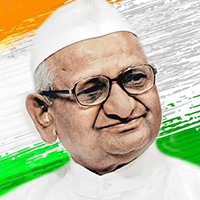Kisan Baburao Hazare
Kisan Baburao Hazare, popularly known as Anna Hazare, is an Indian social activist who led movements to promote rural development, increase government transparency, and investigate and punish corruption in public life.
Anna Hazare, Indian social activist who led movements to promote rural development, increase government transparency, and investigate and punish official corruption. In addition to organizing and encouraging grassroots movements, Hazare frequently conducted hunger strikes to further his causes—a tactic reminiscent, to many, of the work of Mohandas K. Gandhi.
Hazare was born to a farming family and grew up in the village of Ralegan Siddhi, near Ahmadnagar in what is now west-central Maharashtra state. He joined the army in 1963, becoming a driver. While stationed on the border with Pakistan in 1965 during the Indo-Pakistani War, he narrowly survived an attack by Pakistani forces that killed many other soldiers in his unit. Several years prior to that incident, Hazare had discovered the writings of the Hindu leader Vivekananda, under whose spiritual philosophy he began contemplating the meaning of life. He remained in the army until 1978, when he became eligible for retirement with a pension that would enable him to pursue his activism. After his military service Hazare began a rural development project in Ralegan Siddhi,, Hazare started a water conservation program that included land forestation and building weirs, which greatly improved the water supply. The initiative continued with agricultural reforms to improve crop yields and increase available farmland. Eventually, full employment was restored, and the village was able to become self-sufficient in the production of grains. With their greater economic security, residents undertook a number of further improvements, donating their labour to erect a school, a temple, and other buildings. In addition, they established a number of social welfare projects and cooperatives. The transformation in Ralegan Siddhi came to the notice of state officials, who used the program as a model for similar efforts in dozens of villages across Maharashtra.
In 1991,he established the People’s Movement Against Corruption. Hazare began a hunger strike that, together with other forms of activism, spurred the government eventually to remove hundreds of corrupt functionaries from their positions. His experience battling bureaucracy encouraged Hazare to begin campaigning in Maharashtra in 1997 for a “right to information” law till it was enacted in 2005.He halted the another hunger strike after 13 days, after the parliament passed a resolution agreeing in principle to several key demands, including that the Lokpal be allowed to investigate top officials and that an anticorruption unit be established in every Indian state.
He was awarded the Padma Bhushan—the third-highest civilian award—by the Government of India in 1992 for his efforts in establishing this village as a model for others.

Kisan Baburao Hazare
Date of Birth: 15 Jun 1937
Birth Place: Bhingar, Ahmednagar
Proffession: Indian social activist
Nationality: Indian


